By MSc Gvapo Tripinovic and Adam Tripinovic
Hello everyone, and welcome back to our blog ParentingDad.com!
Today Adam and I have prepared for you another exciting article and video about pigeons!
We did our best to research and cover the most interesting topics, so you can find here, in one place, everything you need to know about pigeons.
What are pigeons?
Pigeons belong to the family Columbidae, which also includes doves.
They have short, stocky legs and small to medium-sized bodies. Pigeons have a distinctive appearance, with a rounded head, a small beak, and frequently vibrant plumage.
They can fly at high speeds and over great distances thanks to their muscular bodies and strong wings.

Where do pigeons live?
Pigeons are found everywhere except in the extreme polar regions.
They are highly adaptable and thrive in urban areas, forests, grasslands, and deserts.
Pigeons have a strong affinity for human settlements, foraging for food, and nesting in holes and ledges.
How long do pigeons live?
The lifespan of pigeons varies depending on the species and living conditions.
Pigeons typically live 3 to 5 years in the wild, though some species can live much longer. For instance, homing pigeons, a type of racing pigeon, can live up to 15 years or longer with the proper nutrition and care.
Amazingly, pigeons can live even longer in captivity, reaching 20 years or more with proper care and nutrition.
Pigeons in the US?
Suppose you ask yourself, “Where can you find pigeons near me?”.
The answer is straightforward: they are all over the United States, from busy cities to quiet countryside.
In urban environments, they inhabit buildings, rooftops, and parks.
In suburban areas, pigeons can inhabit any suitable place in pairs or larger groups.
Undisturbed, they can form huge colonies in old silos, abandoned houses, and roofs. Once settled in some place, pigeons are very stubborn and will hardly be pushed out.
5 most interesting facts about pigeons
1. Pigeons have exceptional navigational abilities and are well-known for their ability to find their way home from long distances. As a result, they are highly valued as racing pigeons, a popular sport in many countries worldwide.
2. Pigeons are among the oldest domesticated birds. They have been used for various purposes, but primarily as messengers and pets.
3. Pigeons have an extraordinary ability to recognize human faces and distinguish between different individuals. This makes them highly adaptable to living near humans, earning them the nickname “street smart.”
4. Pigeons have an incredible sense of direction and can navigate using the Earth’s magnetic fields. They also have fantastic vision and can see ultraviolet light, allowing them to perceive the world in ways humans can only fantasize about.
5. Pigeons’ diets are highly adaptable, and they can consume almost anything they can ingest. While they mainly feed on seeds, they are also known to consume insects, fruits, and, in some cases, small animals.
Racing pigeons
Racing and homing pigeons are breeds selected for their ability to navigate and return home from long distances. They are trained and used in competitive racing events in which they are released from a specific location and race back to their home loft.
The races can be hundreds of miles long, and the pigeons use their homing instincts, navigational abilities, speed, and endurance to find their way back.
Racing pigeons price
The pricing of common racing pigeons varies greatly depending on factors such as age, pedigree, training, and performance history. A racing pigeon can average costs from $50 to $500.
However, some pedigreed and well-trained pigeons can have much higher prices.
It’s important to remember that investing in racing pigeons can come with extra costs, like setting up a loft, buying training equipment, and paying for care and maintenance regularly. All that is costly and require a lot of time and dedication.
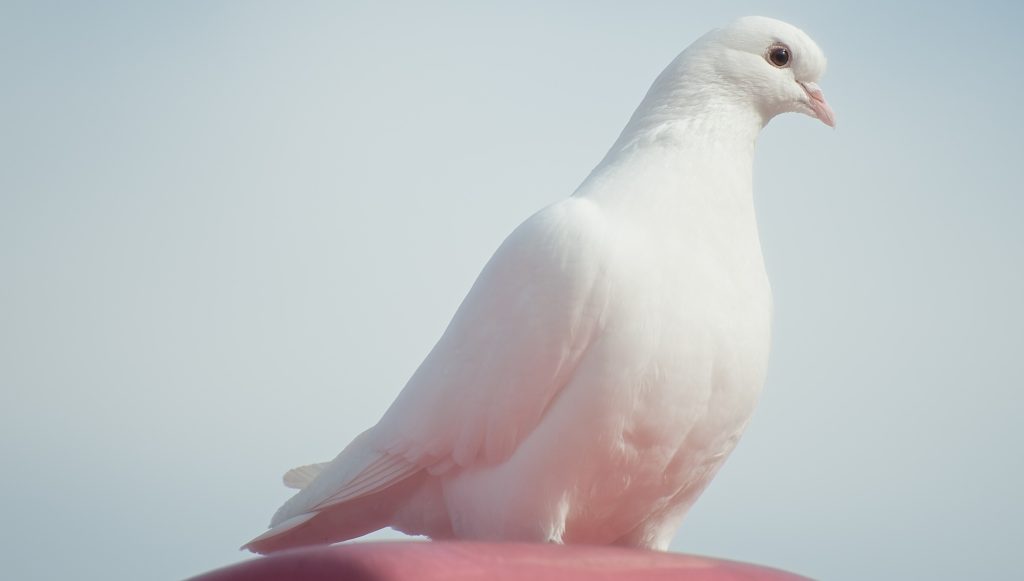
What is the highest price for racing pigeons?
The highest price ever paid for a racing pigeon was a staggering $2.6 million at an auction in Belgium in 2020.
A fan from China paid this fantastic price for a racing pigeon from Belgium.
Can you eat pigeons?
If you have ever wondered if you can eat pigeons, the answer is YES.
There are pigeon breeds that are raised and consumed as food.
Which pigeons are edible?
The King Pigeon, or Squab, is a breed that is raised specifically for meat production.
Squab is a delicacy in many cuisines, and its meat is known for being tender and tasty.
The French Mondain, the German Pouter, and the Red Carneau are other pigeon breeds occasionally used as food.
However, not all pigeon breeds are suitable for human consumption, and it’s essential to follow the regulations before trying to eat pigeons – which we do not approve of or recommend.
To avoid health hazards, raising and processing the pigeons safely is crucial.
Which pigeons are extinct, and how?
One well-known pigeon breed that is extinct is the Passenger Pigeon (Ectopistes migratorius).
The Passenger Pigeon was once one of North America’s most abundant bird species. Their flocks were estimated to number in millions or even billions.
People heavily hunted Passenger Pigeons during the 19th century for their meat, feathers, and entertainment. Massive commercial hunting and habitat destruction resulted in the rapid decline of their population. Often complete flocs have been hunted at once. The entire population of North America’s most abundant bird species stopped existing within a human lifetime.
Martha, the last known Passenger Pigeon, died in captivity in 1914, marking the end of this once-abundant bird species.
The extinction of the Passenger Pigeon is a sobering reminder of the devastating effect human actions can have on wildlife populations within a few decades or even years.
What should I know to keep pigeons as a pet?
Yes, pigeons can be kept as pets.
Pigeons are friendly and social animals. They are smart and can form strong bonds with their human owners. They have unique personalities that can bring joy and exciting moments, which is why many people like having them as pets.
But it’s important to know that, like any other pet, pigeons need proper care, a safe place to live, like a loft or aviary, and attention from their owners.
They also need high-quality food, clean water, and good veterinary care to stay healthy.
Pigeons can live for a long time. Many breeds can live 10 to 15 years or even more! So, if you decide to have pigeons as pets, be ready for a long-term commitment to take care of them and provide for their needs.
Which pigeon is the best for home keeping as a pet?
People choose their pigeons as the best pets from a variety of breeds based on their preferences and requirements.
Homing Pigeons, Fantail Pigeons, and Racing Pigeons are some of the most popular pet pigeon breeds.
Homing Pigeons appeal to enthusiasts and explorers because they can find their way home from great distances.
Fantail Pigeons are striking with their elegant form and fan-shaped tail feathers.
On the other hand, Racing Pigeons are known for being fast and robust in racing competitions, making them the most interesting for people who like high-adrenaline sports and activities.
Ultimately, the “best” pigeon pet breed would be determined by your individual needs, preferences, and intended purpose for keeping pigeons.
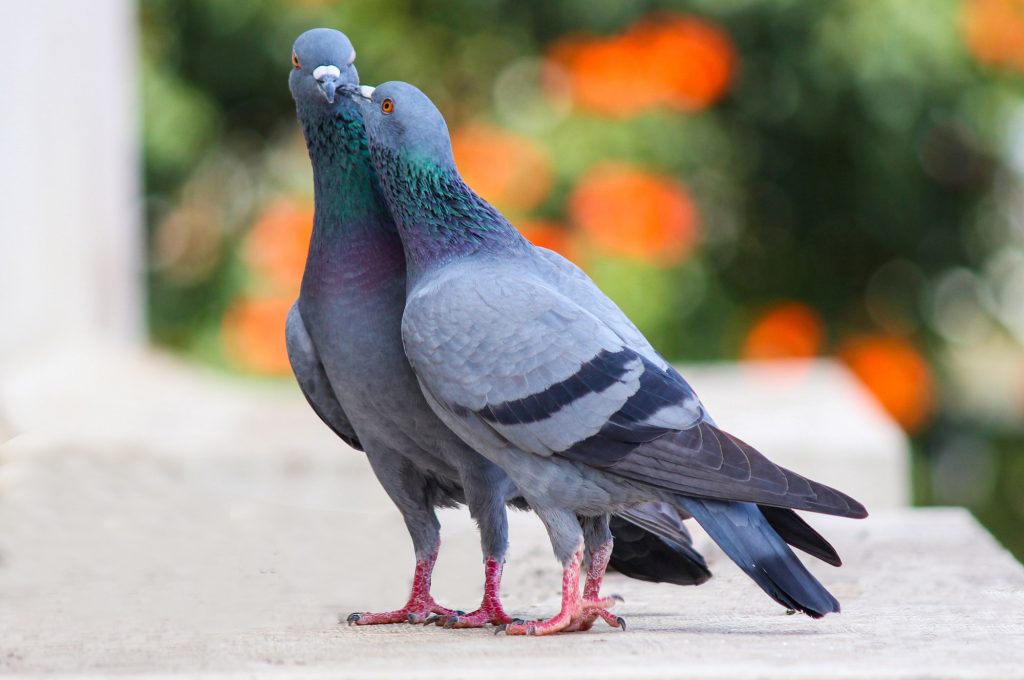
When do pigeons mate?
Pigeons usually mate and have baby chicks during the spring and summer, but the timing can change based on where they live and the weather. They are sensitive to changes in daylight and temperature, which can trigger their breeding behaviors.
Pigeons are devoted to their partners and only have one mate at a time, a practice known as monogamy. They are loyal and form strong, long-lasting bonds.
How do pigeons mate?
The boy pigeon, called the cock, will try to impress the girl pigeon, called the hen.
He will puff up his feathers, coo, and do various things to catch her attention and impress her.
She will respond if the hen likes it, and they will mate. Then, they will have a nest, lay eggs, and, later, have baby chicks.
Since pigeons are monogamous (have only one partner), the boy pigeon will need to impress his mate many times during their lifetime.
When do pigeons lay eggs?
Pigeons lay eggs after mating, but the timing can vary depending on the weather, food availability, and pigeon species.
Usually, pigeons will build a nest in a suitable location, such as a ledge or tree, to lay their eggs.
A pigeon typically only lays one or two eggs at a time. Both mom and dad take turns keeping the eggs warm. The eggs hatch after about 17 to 19 days.
When the eggs hatch, the parents feed the baby pigeons until they are old enough to leave the nest and fly on their own.
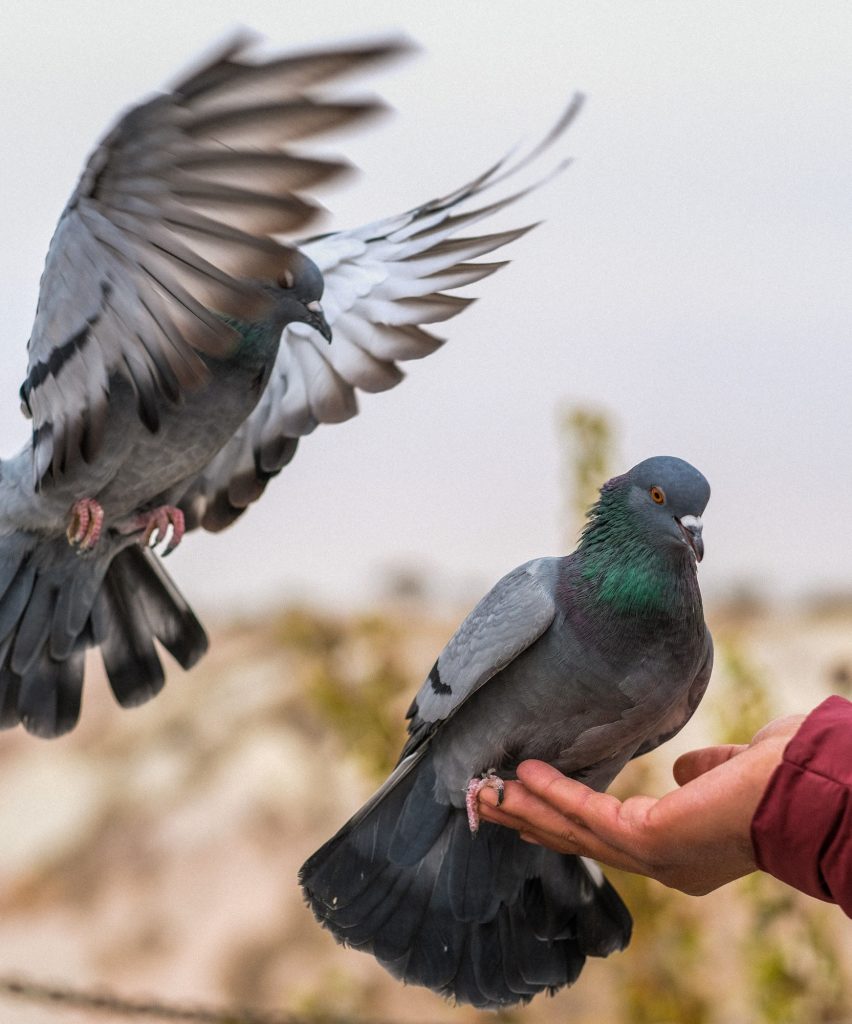
When do pigeons visit you and your home?
Pigeons are wild birds, so they don’t usually “visit” people like pets do.
But if you give them food, water, and a place to feel safe, they will come back to you looking for these things.
Pigeons are intelligent birds that can adapt and thrive in cities. They can find food from leftovers in the streets and parks or bird feeders. To make your place more attractive, you need to provide something a bit better and safer than they already have.
The more pigeons feel at home near you, the more they will visit you.
How do pigeons fly?
Pigeons are excellent at flying! They have strong muscles and a sleek body shape that helps them fly smoothly.
When pigeons flap their wings, they generate powerful lift that helps them go up in the air. Their large and robust wings are perfect for catching the wind and lifting them up.
Pigeons can also change the shape of their wings to alter how they fly.
This lets them move, glide, or almost hover like a helicopter, depending on what they want to do.
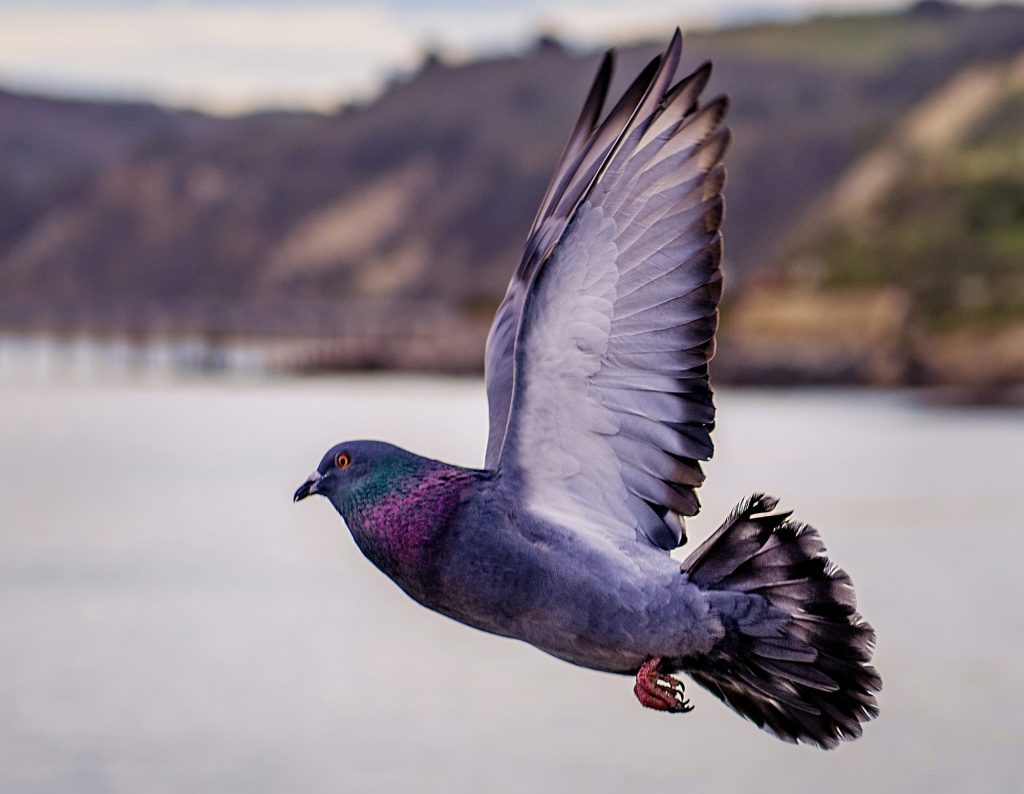
When do pigeons fly?
Pigeons are diurnal, which means they are active during the day and almost always fly during daylight.
Pigeons fly to find food, water, and a safe place to build their nests or to get away from animals that want to eat them.
After flying far away, they also fly to find their way home, making them popular for racing and carrying messages.
When do pigeons start flying?
Pigeons learn to fly at around 4 to 6 weeks of age, although the exact time can depend on the pigeon’s species and how it grows.
Before they can fly, baby pigeons practice flapping their wings and jumping on nearby branches and in the nest.
As they get stronger, they leave the nest for short flights to practice and improve their flying skills.
Will pigeons attack humans?
If you are thinking about having pigeons as pets and wondering if they are safe and will attack you, the answer is: probably not. Pigeons are typically not aggressive toward humans.
They are shy, timid, and gentile animals whose instinct is to avoid any confrontation with humans.
Sometimes, however, pigeons may act aggressively if they feel scared or trapped and feel that’s their only way to survive.
During the breeding season, they may get threatened and peck or flap their wings to defend their nests. If a pigeon is hurt or sick, it may act in ways you wouldn’t expect and get aggressive to protect itself. Remember that pigeons are wild animals, so it’s best to keep a safe distance and try not to make them upset to avoid any problems.
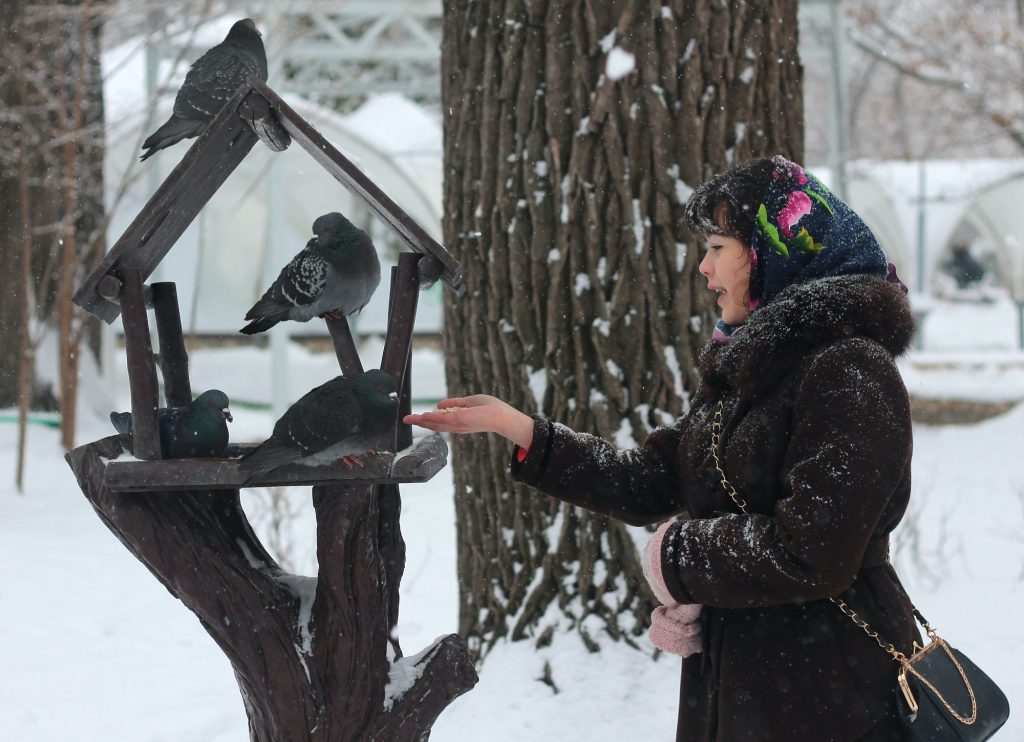
What do pigeons eat?
Pigeons are omnivorous, meaning they can eat almost any food. Most of the time, they eat seeds, grains, fruits, and vegetables, but they will not be shy about grabbing and eating insects and tiny animals. In urban environments, they also consume human food scraps, which are plentiful and easily available.
But it’s important to remember that human food isn’t very good for them, and they need a balanced diet to stay healthy.
Do pigeons eat bread?
Yes, they do, but it’s not very good for them because it doesn’t have enough nutrients and has too many carbs. If they overeat bread, it can be bad for their health.
Do pigeons eat peanuts?
Yes, but peanuts are not the best food for them because they have too much fat and protein, which can be challenging to digest. Giving them a few peanuts as a treat and not as their primary food would be best.
Do pigeons eat sunflower seeds?
They do, yes. Sunflower seeds are good for them because they have healthy fats, protein, and other ingredients they need to stay healthy. Pigeons can eat sunflower seeds but should only consume a small or moderate amount of them as part of a balanced diet.
Do pigeons eat meat?
Yes, if they can find it, they will eat meat. But meat doesn’t make up a big part of their diet.
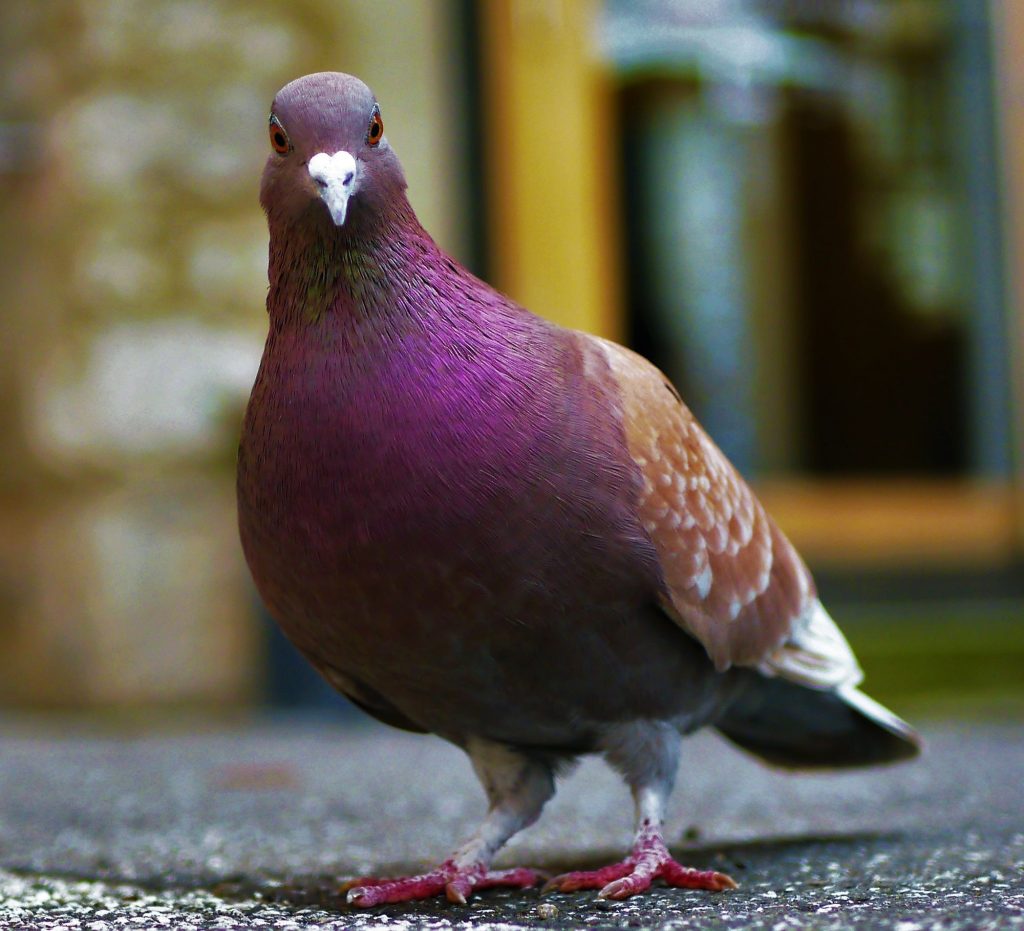
Are pigeons doves?
Yes, pigeons are also called “rock doves.”
Usually, when people say “pigeon,” they mean the “bigger ones,” and “dove” when they want to describe the “smaller ones.”
There is no strict distinction between the pigeon and the dove except for size.
Are pigeons smart?
Did you know that pigeons are actually pretty smart birds? Even though they might not be the most intelligent and on pair with ravens and parrots, they have some impressive skills, like problem-solving and an excellent memory that helps them find their way back to their nests from far away.
And did you know that different types of pigeons can have different levels of intelligence? Overall, watching pigeons can be really fun and exciting, and they make great companions if you decide to care for and feed them.
Are pigeons invasive?
Humans have spread some pigeon species, such as feral pigeons, to new areas, where they now have sizable populations and can be harmful in some ways.
Feral or wild pigeons are primarily found in cities and thrive in man-made places like parks and buildings.
Feral pigeons can be a nuisance because their poop can damage buildings and monuments and spread some diseases. In large groups, they can also be quite noisy and annoying.
Why do pigeons coo?
Hey, have you ever heard a pigeon cooing? They use their coos to communicate with each other.
They coo to attract or to talk to their mate during nesting and breeding. It’s their way of saying, “Hey, the best-looking bird has just arrived.” or “Is there any good food nearby?” or “This nest is a mess! Bring some material to tide it up before baby chick hatches.”
Pigeons use their coos to tell their mates and other pigeons in their group how they’re feeling and what they want. So the next time you hear a pigeon cooing, you’ll know they’re chatting it up, exchanging information, making a pigeon song, or forging some plans!
In addition, pigeons flap their wings and make other noises depending on the context, species, or individual behavior to convey different messages or pass some urgent news.
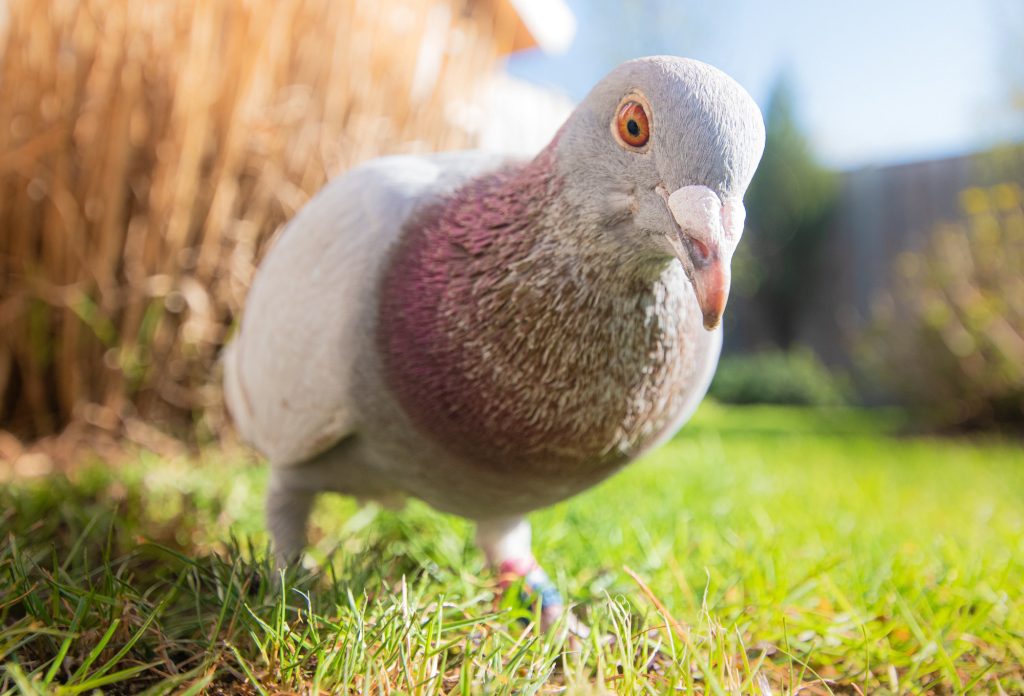
Why do pigeons bob their heads?
You have probably seen how pigeons bob their heads up and down many times and wondered why they do that.
It might look funny, but they do this because it helps them see better.
Pigeons do not have the same kind of eyesight as humans.
While we rely more on eye movements to catch and hold images while in motion, pigeons do the same by bobbing their heads.
It helps them see things from various angles and distances, allowing them to determine how far away things are and stay safe.
So next time you see a pigeon walking around and bobbing its head while watching you, maybe he is just trying to figure out how far you are.
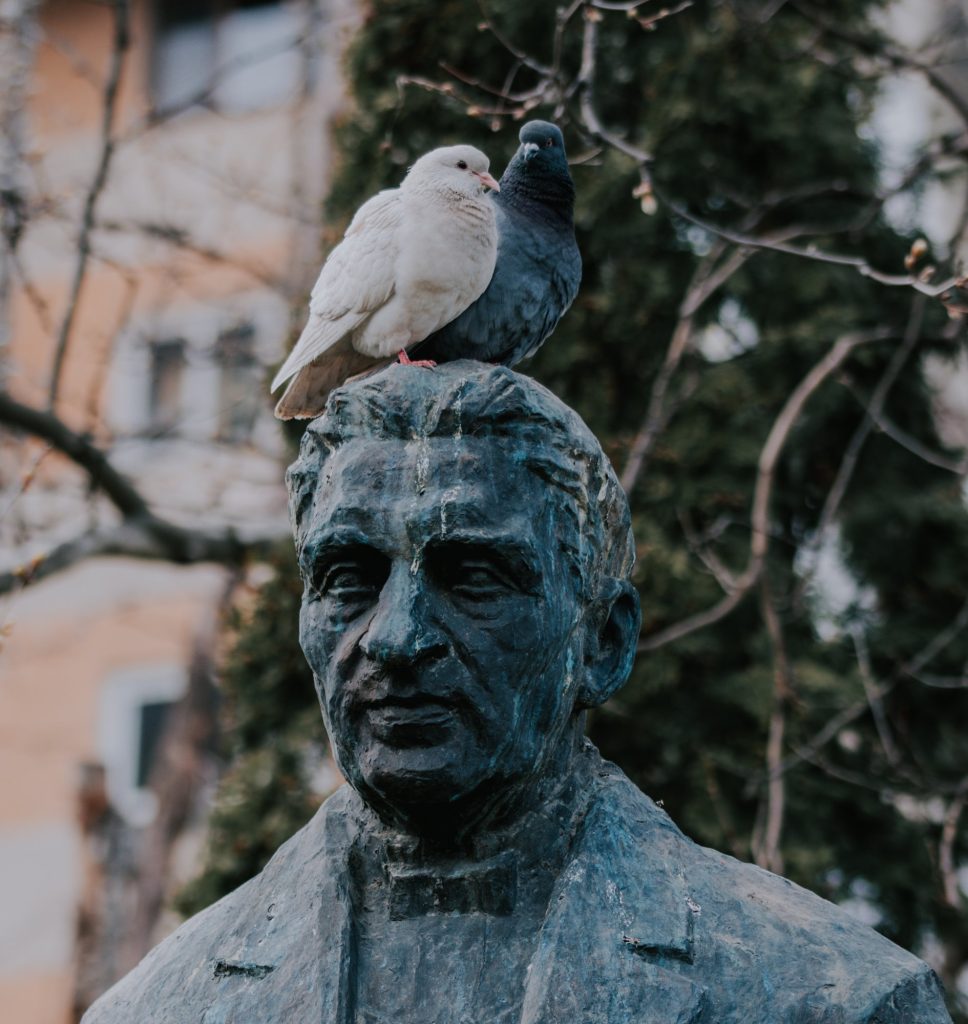
4 reasons why pigeons are bad
1. Nuisance and damage.
Pigeon droppings, nesting materials, and feeding habits can sometimes cause damage to buildings, monuments, infrastructure, AC systems, and cars.
In large numbers, pigeons can be very noisy and annoy people.
2. Health concerns.
Have you ever seen a group of pigeons hanging out together? While they might seem harmless, having too many birds in one place can be a health hazard. Pigeons, like all other birds, poop often and poop a lot. Their droppings can contain germs that make people and animals sick.
In addition, pigeons can also carry diseases that can pass on to humans and animals. Awareness of these health concerns is important if you live in an area with many large groups of pigeons.
3. Urban conflict.
Pigeons tend to compete with other bird species for resources like food and places to nest.
Being more robust and in more significant numbers than most other bird species in urban areas, pigeons can push out other birds when food is scarce or when choosing the best nesting places.
If you pay attention, you can see that in many cases, pigeons can disturb, stress, and chase out smaller birds in the birdhouses we make and place to try to find food there.
All this can lead to decreased populations of other bird species in urban environments.
4. Dangerous pests.
In some locations, pigeons are considered dangerous pests.
They can cause significant material damage and threaten human lives around airports and planes.
Pigeons can fly into planes and cause a “bird strike” (collision between a bird and a plane).
That’s definitely not good because it can damage the plane and endanger the people inside it! So, even though pigeons are fantastic, fun, and intelligent birds, they’re not welcome in certain places, and airports are the perfect example.
4 reasons why pigeons are good
Humans have valued pigeons for various reasons. We will list here some we find the most important and interesting.
1. Pigeons have been our loyal companions for centuries. We’ve raised them for food, feathers, and eggs. They have played an essential role in human history, serving as messengers, friends, and symbols of peace. During times of conflict, they even became war heroes! With that said, we consider that no one can deny the significance of our feathered friends.
2. Pigeons play a vital role in our ecosystem. Did you know that they help spread the seeds of plants by eating and then pooping them out in different areas? It might sound yucky, but the “pigeons’ way of planting with fertilizer” is essential to growing new plants and maintaining a healthy and diverse environment. Pigeons also serve as a food source for other animals, like birds of prey and mammals, which helps keep the ecosystem balanced.
The next time you see a pigeon hanging out in your backyard, you’ll know it’s doing more than just looking for food scraps. You can help nature by providing them with a healthy variety of good food and seeds, and you can be sure you helped plant many new plants around.
3. Scientific research. Did you know pigeons have helped scientists with lots of research? They’ve been used to learn more about how animals behave, navigate, learn, and think. Pigeons are smart and have an exceptional talent for finding their way home over long distances, which scientists have studied and used to understand more about animal behavior.
So, the next time you see a pigeon, you can think of them as scientists’ little helpers.
If you want to learn more about pigeons and their role in nature, you can observe pigeons yourself and see how they behave and navigate in your backyard! Start taking photos and notes and share that information with friends as we do here.
4. Entertainment and companionship. Many people enjoy having pigeons around because they’re beautiful, unique and make great companions. Some people enjoy watching them in their local environment and taking photos and notes about their behavior and each individual. Birdwatching can bring a lot of fun.
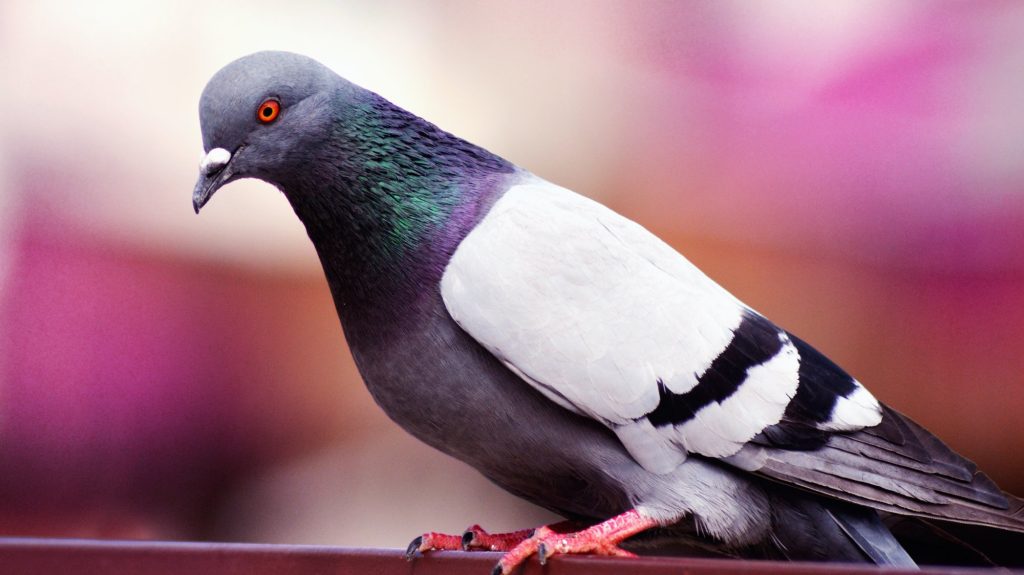
5 things pigeons do not like
Do you ever wonder what pigeons like and don’t like? Just like humans, pigeons have preferences and things they don’t like. Some everyday things that pigeons dislike are:
1 Disturbances.
Pigeons dislike loud noises, sudden movements, or other potentially frightening disturbances. It’s like when someone sneaks up on you and scares you. Pigeons can get scared, too, and they don’t like it.
2 Predators.
Pigeons are prey animals. They fear predators like birds of prey, mammals, or humans. Even the scent of them can scare them enough to avoid certain places.
Imagine the feeling of seeing a wolf or a large dog slowly approaching you, with its eyes fixed on you. You wouldn’t just glance at it and think, “Oh, it’s completely harmless.” That’s how pigeons look on almost any larger animal and humans nearby.
3 Harassment.
Pigeons do not like being chased, harassed, or bothered by people or other animals. As in the previous case, they simply do not know why the other is chasing them. Remember, in nature, almost by rule, if someone larger is chasing you, it is probably because it wants to eat you.
4. Unfamiliar or threatening environments.
Pigeons may feel uncomfortable or avoid unfamiliar or threatening environments, such as areas with high human hectic activity, bright lights, or small spaces with little room to fly away quickly.
5. Lack of food and water.
Pigeons need food and water to survive. If they are scarce and risky to get, pigeons will go away and find someplace where life is better.
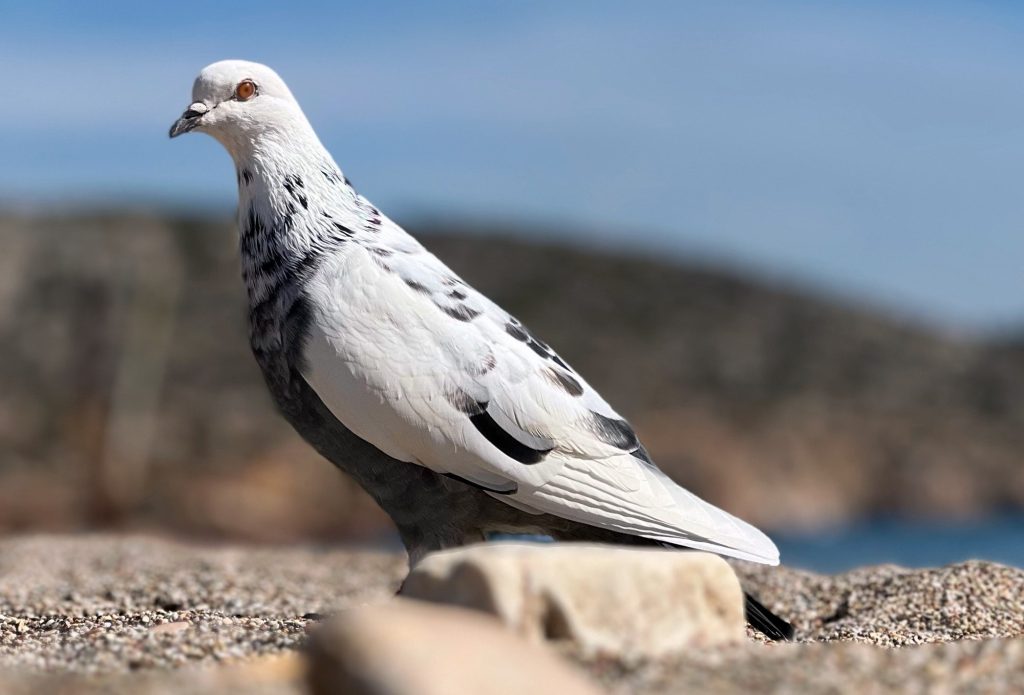
Are pigeons endangered, and will they go extinct?
Are you curious about whether pigeons are at risk of disappearing permanently? The good news is that most pigeon species are not endangered. Pigeons thrive almost anywhere, including cities, forests, fields, and wetlands.
Although human activity and habitat loss caused some pigeon species, like the passenger pigeon, to go extinct, most have strong and stable populations.
While generally not at risk, pigeons face threats from pollution, diseases, and humans, like almost all wild animals.
We hope you have learned something interesting about pigeons today with us, and thank you for your support!
While here, please check some of our other Educational, Active Life and Healthy Food, or How to be a Better Dad – Q & A articles.
If you’d rather watch a video or listen to our articles, check out our YouTube channel, Top 10 Facts.
Adam and I wish you a great day. Stay well, and keep smiling.
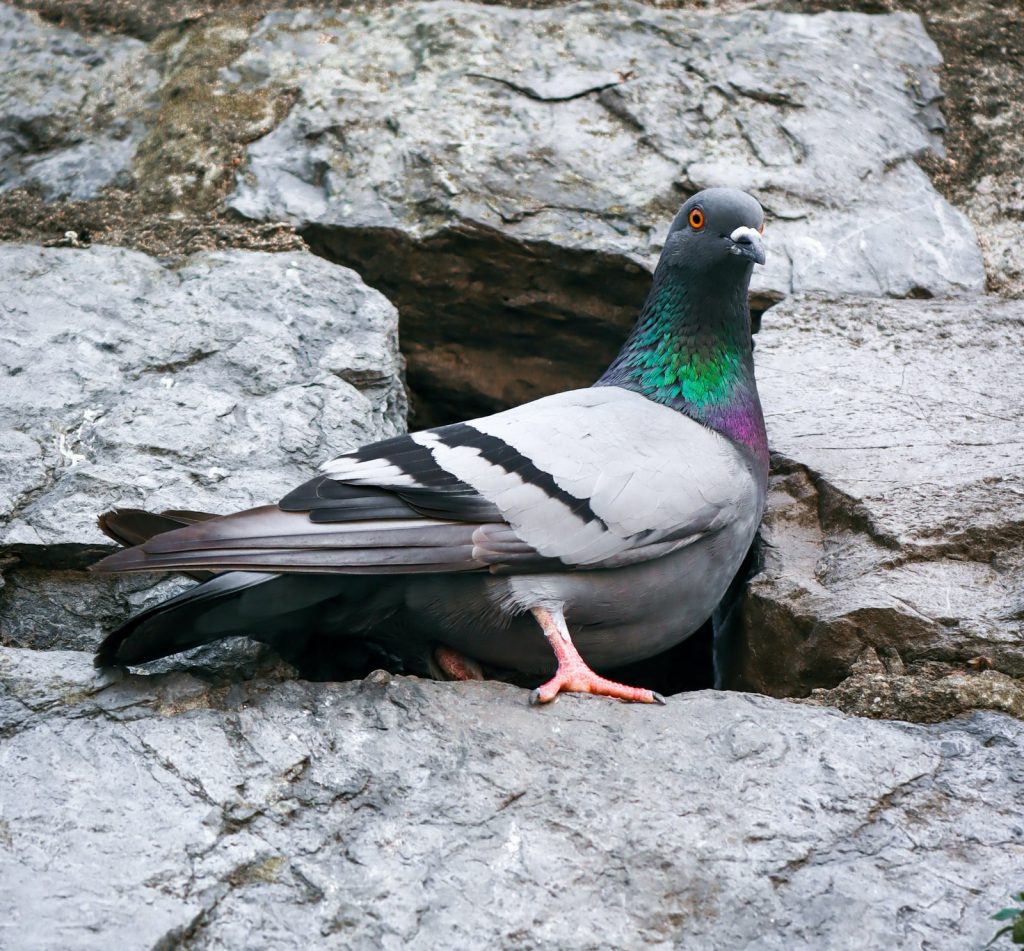
You can find more great articles and videos about animals here:
Alpacas, Butterflies, Cheetahs, Dolphins, Do Fish Sleep, Dog – Which dog breeds are the smartest, Elephants, Great White Sharks, Sharks in aquariums, Snakes, Hummingbirds, Jellyfish, Lions, Pigeons, Red Pandas, Owls, Seagulls, Snails, Squirrels, and Wolves.
What animals would you like us to describe next?
Tell us in the comments below!
Disclosure: This article might contain product links, so we can get a small commission if you buy them at no cost to you if you decide to make a purchase. You can read more about it on our disclosure page. That way, you support this blog and our educational YouTube channel, for which I am thankful.
This site is for entertainment only.
